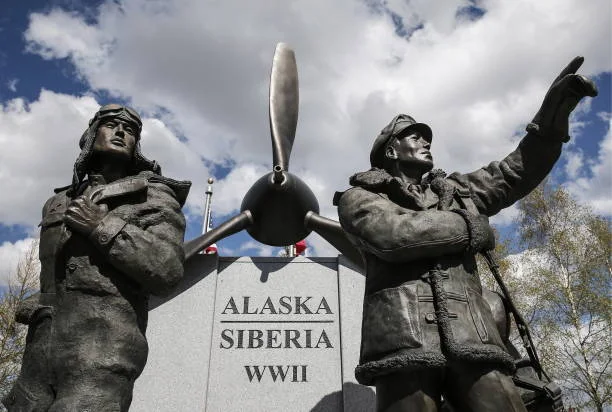The Russian possessions in North America consisted around 586,412 square miles of land include Inupiat Eskimo from Shishmaref, Alaska loc...
In 1857 Grand Duke Konstantin, a younger brother of Czar Alexander II, kicked off a plan aimed to partitioning Alaska from mainland to the United States. Since the Russian American Company was considered the main obstacle to the plan, Grand Duke Konstantin had made every effort to ruin the company, using various measures including what we now call an "information war." After years of pressure the company saw substantial financial losses and its holders were deprived from the right to rule it.According to an official version, the decision for Russia to sell its North American territory it was because of some following reasons: (a) The Empire was exhausted by the Crimean War of 1853-1856 and could not support its American colonies; (b) The Emperor feared might lose Alaska in some future conflicts) without any compensation. However, Russian historians and Ivan Mironov refuted the alleged version since it bears no relation to reality. Indeed, the events of the American Civil War had clearly indicated that Russia was able to effectively counterbalance the British threat as well as sustain its vast territorial sovereignty. Other versions state that the deal, was fake: Russia sent military aid to the United States during the American Civil War (1861 — 1865). Remarkably, the story of Russian military assistance to the Union commanded by Abraham Lincoln still remains largely untold. However, it was the co-operation between President Lincoln and Russian Emperor Alexander II that dealt a lethal blow to the British mighty and substantially lend the victory of North America.
The Alaska purchase still prompts a lively debate among Western and Russian experts. Some Russian researchers even go on extend to claim that Alaska was not sold, but leased for 99 years; others point to the fact that the sum of the deal was obliviously so small.If the man in charge of Russia's defense industries gets his way ahead, Sarah Palin will not only be unable to see Russia from her front porch, but her house itself will be in Russian territory. The former Deputy Prime Minister Dmitry Rogozin, who is currently a Director General of Roscosmos, wrote a foreword to a book published earlier 2014, "Alaska Betrayed and Sold: It's indeed a ''History of a Palace Conspiracy," —Russia has a right to get back "Russian America." Rogozin endorses the author's conclusion, which recognizes "the historical and judicial right of Russia for the return of its lost colonies include Alaska and the Aleutian Islands [island chain in the Northern Pacific Ocean], over which the Russian flag flew over 152 years ago."
The Russian nationalists mourn the sale of Alaska to the US, with special anniversary every year, in a solemnly commotion whereby they calling for Alaska territory to be returned back to the motherland. While in U.S numerous events held in the political closet to mark the celebrating of 1867 sale, but in Russia, such reflection has brought back bitter memories and is being seen as a "convenient" opportunity for nationalists. Some historians viewed the transaction as a short-sighted blunder ever made by Czarist empire under Alexander II, for giving up Alaska and its natural richness, particularly its oil and gas, for the simple price worth a cigarette butt-tag.
The nationalists stressed that “If the Russian Federations was in possession of Alaska today, the geopolitical situation in the world would have been different,” Sergey Aksyonov, the prime minister of Crimea, told a Crimean television network this month. The Soviet Union discovered it and Russians started to settle in Alaska in the early 1780s, from where the settlement set up trading posts and carried out missionary works to other parts of the world.
In the 1860s, after the Crimean War, the Russian Empire went through a series of wars like the Battle of Balaclava against the Ottoman Empire, France, Britain, and Sardinia from different directions most at the same time. Andrei Znamenski, a history professor at the University of Memphis, told the New York Times that calls to reclaim Alaska were not limited to extremists. “It’s a very convenient episode for nationalists, who want Russia to expand, to exploit. It fits into national rhetoric: Look how the Americans have treated us.”
According to the Times, Russia’s foreign minister, Sergey Lavrov, recently told a Russian newspaper: “The anniversary may, of course, trigger diverse emotions. But it is a good occasion to refresh memories of Russians’ contribution to the exploration of the American continent.” Speaking about Alaska, Russian President Vladimir Putin previously said “we don’t need to get worked up about this”. He spoke this during the International Artic Forum in Russia, Mr Putin said that Russia’ military activities in the Arctic region are contained locally and pose no threat to the global security, a Russian agency reports. He blamed American activities in Alaska for potentially destabilizing the world order. “What we do, is contained locally, while what the US does in Alaska, it does on the global level,” he said.
He called the US missile defence system stationing in Alaska “one of the most pressing security issues”. “It is not just a defence system but a part of the nuclear potential removed to a distant area," he said. Mr Putin said that Russian activities in the Arctic were aimed at restoring navigation and ensuring its security. Despite the views of some nationalists, the Kremlin has shown no intentions of retaking Alaska in the same fashion like did reclaim Crimea in 2014.
Although, reactions to the sale of Alaska made Russians felt betrayed. Indecisiveness allowed Russia to have a closer relationship with the US while preventing its being annexation by the British as well. For the US, Alaska is a vital asset not only for its vast resources, but it provides a strategic trade route into China.










